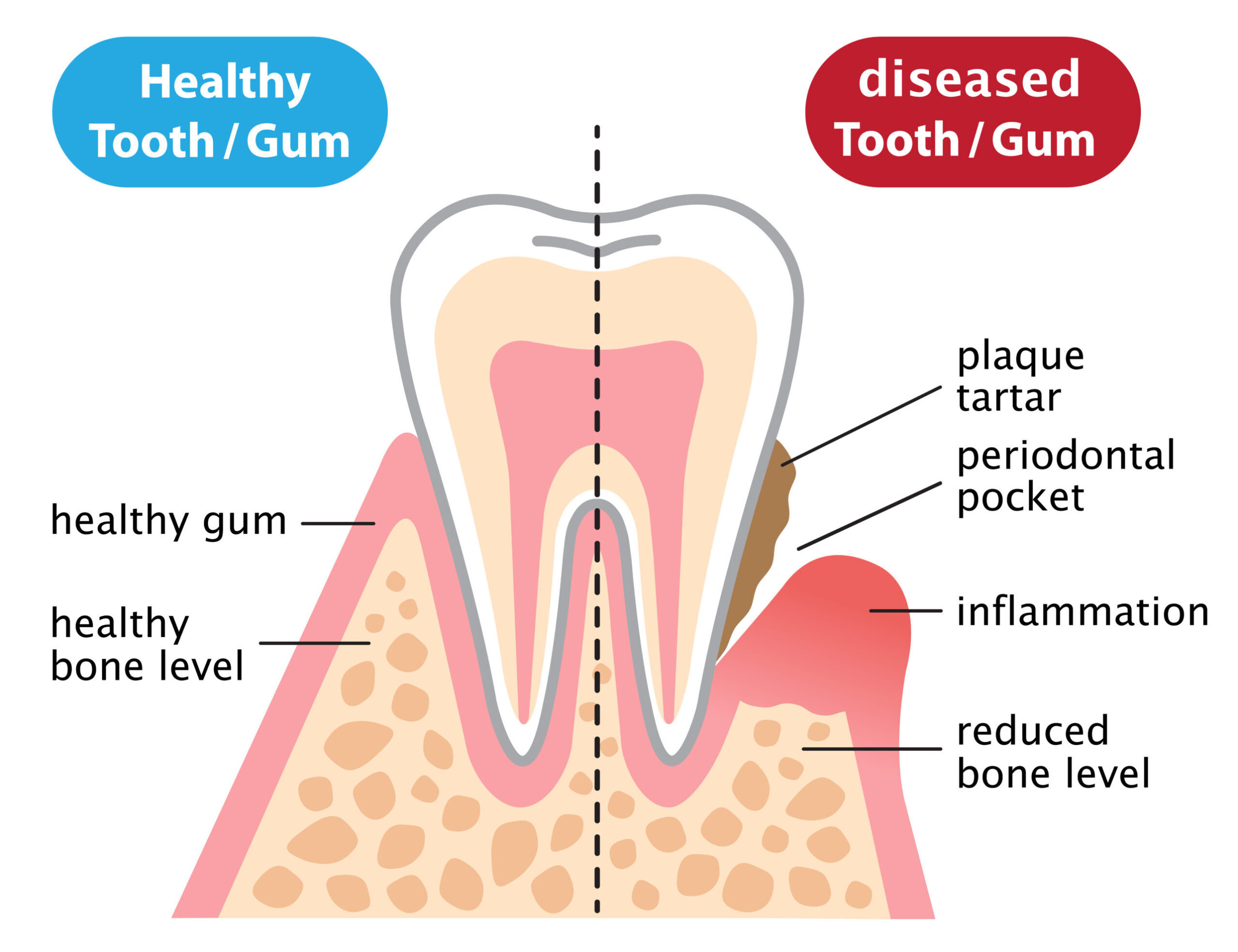Red, swollen gums:
Healthy gums should appear firm and pink. Redness and swelling are early signs of inflammation.

At Figtree Dental in the serene town of Figtree, NSW, we are dedicated to providing exceptional dental care, with a particular focus on effectively treating gum disease. Our experienced dental team is committed to helping you achieve optimal oral health through personalized and thorough treatment plans. We understand the vital importance of healthy gums for overall well-being, and we offer premier solutions for gum disease.
Gum disease, known medically as periodontal disease, refers to an infection affecting the tissues that support and surround the teeth. It is a leading cause of tooth loss in adults, yet it is often preventable through proper oral hygiene and regular dental check-ups. The disease progresses through stages, starting with gingivitis and potentially advancing to periodontitis if not treated.
Gingivitis is the initial stage of gum disease, characterized by inflammation of the gums. It typically results from plaque accumulation, a sticky film of bacteria on the teeth. Symptoms include redness, swelling, and bleeding of the gums, especially during brushing or flossing. Fortunately, gingivitis can be reversed with good oral hygiene and professional dental care.
If gingivitis is left untreated, it can develop into periodontitis, a more severe form of gum disease that impacts the deeper supporting structures of the teeth, including bone. As this condition progresses, the gums may recede from the teeth, creating infected pockets. The body’s immune response, combined with bacterial toxins, can harm the bone and connective tissue that support the teeth. Without intervention, periodontitis may lead to tooth loss.
Early detection of gum disease symptoms can help halt its progression and preserve your oral health. Common indicators include:
Healthy gums should appear firm and pink. Redness and swelling are early signs of inflammation.
Bleeding during brushing, flossing, or eating hard foods is a common symptom.
Gums that pull away from the teeth, making them appear longer, may indicate periodontitis.
Ongoing bad breath or a bad taste in the mouth, even after brushing, can signal gum disease.
As supporting structures weaken, teeth may loosen or shift position.
Pain while chewing or sensitivity to hot and cold can be symptoms of gum disease.
We conduct a thorough examination of your gums, teeth, and supporting structures, including reviewing your medical and dental history, a clinical examination for inflammation and recession, and X-rays to assess bone levels.
Our scaling and root planing procedure involves deep cleaning to eliminate plaque and tartar from above and below the gum line, smoothing root surfaces to encourage gum reattachment.
Depending on your condition, we may prescribe antibiotic mouth rinses, topical antibiotics, or oral antibiotics to help control infection and promote healing.
In advanced cases, surgical options such as flap surgery to remove tartar deposits and bone and tissue grafts for regeneration may be necessary.
To prevent recurrence, we recommend regular dental visits every three to four months for check-ups and cleanings. Maintaining good oral hygiene at home—brushing, flossing, and using mouth rinses—is also essential.
Selecting the right dental clinic for gum disease treatment is crucial for optimal outcomes. Here’s why Figtree Dental is the preferred choice for residents of Figtree, NSW, and surrounding areas:
Our staff has extensive experience in diagnosing and managing gum disease, providing compassionate support while prioritizing your comfort throughout the treatment process.
Utilizing cutting-edge equipment and techniques, we deliver effective, minimally invasive treatments. Our advanced tools enhance diagnosis and treatment, improving your experience and results.
We understand that each patient is unique, which is why we create customized treatment plans tailored to your specific needs and goals for optimal care.
In addition to gum disease treatment, our extensive range of dental services addresses all aspects of oral health, from preventive measures to restorative and cosmetic procedures.
We strive to create a warm, inviting atmosphere for our patients. Our friendly team and comfortable facilities aim to make your visits as pleasant as possible.
We believe in equipping patients with knowledge to maintain long-term oral health. Through comprehensive education about gum disease, its causes, and preventive strategies, we empower you to sustain a healthy smile.
Gum disease mainly results from plaque buildup, a sticky film of bacteria on teeth. Factors include poor oral hygiene, smoking, genetic factors, certain medications, and underlying health conditions.
While gum disease itself is not contagious, the bacteria that cause it can be transmitted through saliva, such as through sharing utensils or kissing.
Gum disease can often be managed and controlled. Early stages like gingivitis can be reversed, but advanced periodontitis may require ongoing maintenance to prevent recurrence.
Diagnosis involves a clinical examination to assess signs of inflammation, measuring pocket depths around teeth, and using X-rays to evaluate bone loss.
Scaling and root planing is a deep cleaning procedure that removes plaque and tartar from above and below the gum line and smooths root surfaces to promote gum reattachment.
Those with gum disease generally require dental visits every three to four months for professional cleanings and monitoring.
Yes, gum disease has been linked to various systemic health conditions, including heart disease, diabetes, respiratory issues, and complications during pregnancy.
Signs of gingivitis include red, swollen gums that bleed easily, persistent bad breath, and sensitivity in the gums.
Preventing gum disease involves good oral hygiene practices, such as brushing twice daily, daily flossing, using an antiseptic mouthwash, and visiting the dentist regularly for cleanings and check-ups.
Factors include poor oral hygiene, smoking, diabetes, hormonal changes, certain medications, genetic predisposition, and weakened immune systems.
Children can develop gingivitis, especially if oral care is inadequate. However, periodontitis is more common in adults.
Gingivitis typically does not cause pain, but advanced periodontitis can result in discomfort, pain while chewing, and tooth sensitivity.
Yes, a diet high in sugars and carbohydrates can promote plaque buildup, while a balanced diet rich in essential vitamins and minerals supports overall oral health.
The progression of gum disease varies, but it can advance from gingivitis to periodontitis within months to years if untreated.
While good oral hygiene and a healthy diet are vital, natural remedies alone cannot effectively treat gum disease. Professional dental care is necessary for proper treatment.
Stress can weaken the immune system, making it harder for the body to fight off infections, including gum disease.
Diabetes increases the risk and severity of gum disease, and gum disease can complicate blood sugar control.
Chronic gum disease can lead to widespread inflammation, potentially impairing the immune system’s ability to fight infections.
The risk of developing gum disease increases with age due to plaque accumulation over time, changes in immune function, and potential neglect of oral hygiene.


